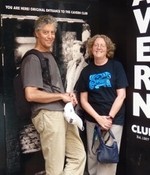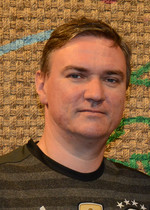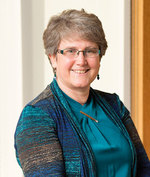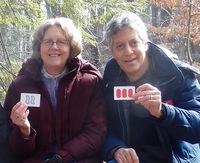EPaDel Spring 2018 Section Meeting
The Spring 2018 meeting was held March 24, 2018 at Temple University.
Invited Speakers
 Gary Gordon & Liz McMahon (Lafayette College)
Gary Gordon & Liz McMahon (Lafayette College)
Moving faces to other places: Facet derangements of the hypercube- Derangements are a popular topic in combinatorics classes. In this talk, you’ll see a generalization to face derangements of the n-dimensional hypercube. These derangements can be classified as odd or even, depending on whether the underlying isometry is direct or indirect, providing a link to abstract algebra. We emphasize the interplay between the geometry, algebra, and combinatorics of these objects, with lots of pretty pictures.
- Gary Gordon received his B.A. from the University of Florida in 1977 and his Ph.D. from the University of North Carolina in 1983. His research interests are in combinatorics. He ran Lafayette College’s REU program for a decade and has thoroughly enjoyed doing research with enthusiastic undergraduates. His favorite research partner is Liz, though. He loves baseball, enjoys climbing things, and occasionally plays the piano.
- Liz McMahon received her A.B. from Mount Holyoke College in 1975 and her Ph.D. from the University of North Carolina in 1982. Her research interests are in algebra, combinatorics and finite geometry. She is currently running Lafayette College’s REU program and enjoys sharing math with anyone who will listen. Her favorite research partner is Gary, not surprisingly, and she has coauthored a book, the Joy of SET, with Gary and their two daughters. She loves reading, cycling, hiking, and traveling.
- Both Liz and Gary are past winners of the EPaDel section James P. Crawford teaching award.
 Frank Fiedler (Wesley College)
Frank Fiedler (Wesley College)
It's Good To Be A Generalist- Mathematics is a wonderful toolbox to solve relevant problems in the workplace. And while we are usually hired for a particular specialty we possess, mathematicians and statisticians tend to forget that it is an analytical mindset and the exposure to a broad range of mathematical topics during our education that makes us valuable team members. It is the ability to draw from all sorts of different fields of mathematics to solve a pressing problem that sets us apart. I will present some typical problems I and colleagues and friends from financial industry, academia, and engineering encountered to highlight the importance of a diverse and general education in mathematics. Possible solutions to these problems will involve ideas usually taught at a 100 or 200 undergraduate level course.
- Frank Fiedler is Professor of Mathematics and Chair of Mathematics and Data Science at Wesley College in Dover, Delaware. He received his Ph.D. in Mathematics from the University of Delaware and his M.Sc. in Mathematics from Dresden University of Technology. His research interests include STEM education, particularly informatics, and solving practical problems in digital communications using a combination of mathematical techniques.
 Carol Schumacher (Kenyon College)
Carol Schumacher (Kenyon College)
Zeroing in on the Implicit Function Theorem- In mathematics, it often happens that baroque, highly technical results disguise beautiful underlying principles. This talk traces the path from the elegant contraction mapping principle to the rather inscrutable implicit function theorem -- a path that passes through Newton’s method for finding roots, linear algebra and linear approximation, and the geometry of multidimensional surfaces.
- Carol Schumacher is Professor of Mathematics at Kenyon College and has served three terms as department chair. She received her Ph.D. in mathematics from The University of Texas at Austin. Schumacher is the recipient of Kenyon's Trustee Teaching Award and of the Ohio Section MAA’s Distinguished Teaching Award. She is the author of Closer and Closer: Introducing Real Analysis and Chapter Zero: Fundamental Notions of Abstract Mathematics, 2E. Schumacher is active in the Mathematical Association of America. She was co-chair of the 2015 CUPM Curriculum Guide to Majors in the Mathematical Sciences and is MAA VP. She has addressed Project NExT fellows at their summer workshop and has been involved with workshops that help faculty incorporate inquiry into their classrooms.
Workshop
 The Joy of SET
The Joy of SET
Led by Gary Gordon & Liz McMahon (Lafayette College)- The card game SET has connections to finite geometry, linear algebra, probability, combinatorics, and coding theory. We will use the cards to motivate these topics, moving back and forth between the game and the math, enhancing your appreciation of both. There will be hands-on activities, and no familiarity with the game or these topics will be assumed.
Faculty Contributed Paper Session
Faculty talk schedule (PDF)
Faculty talk abstracts (PDF)
More information about the Faculty Contributed Paper Session.
Student Contributed Paper Session
Student talk schedule (PDF)
Student talk abstracts (PDF)
More information about the Student Contributed Paper Session.
Student Poster Session
Poster Session Abstracts (PDF)
The poster session is open to undergraduate and graduate students who want to present either original or expository mathematics work in the form of a poster. Presenters will be expected to be available for a general description of the poster and questions during the session. Recommended poster size: 36inx48in.
Student Competition
Participants will compete in two rounds of mathematical contest for fancy prizes, camaraderie, and most of all fun!
- Round 1: Students will group together in groups of three or four and work as a team on a set of intermediate-to-challenging math problems for 30 minutes. Pencil and paper only! As you are working on the problems, you may check with the moderators to see if you are correct or not. As the answers come in, a tally will kept of each team's score.
- Round 2: The teams with the highest scores in the first round advance to a lightning round where they are asked a set of "mental math" questions, ones that you can do (with some hard thinking) in your head. No pencil or paper allowed in this round, and any member from any team can buzz in to give the answer. At the end of the lightning round, exactly one team will be deemed champions and bring home some kingly prizes!
Lunch Table Discussions
Lunch Discussion Topics (PDF)
Schedule
The conference takes place in the Science Education and Research Center (SERC).
| Time | Event |
|---|---|
| 8:30 - 10:10 | Registration SERC Lobby |
| 8:30 - 4:00 | Silent Auction SERC Lobby |
| 8:30 - 9:05 | Light Breakfast Reception (Coffee/tea, pastries, bagels) SERC Lobby |
| 9:05 - 9:15 | Welcoming Remarks Michael Lawlor, Assistant Dean for Undergraduate Affairs SERC 00116 |
| 9:15 - 10:10 | Gary Gordon & Liz McMahon (Lafayette College) Moving Faces to Other Places: Facet Derangements of the Hypercube SERC 00116 |
| 10:10 - 10:40 | Student Poster Session & Coffee Break SERC Lobby |
| 10:40 - 11:35 Concurrent sessions |
Frank Fiedler (Wesley College) It's Good To Be A Generalist SERC 00116 | Student Competition Anderson Hall |
| 11:35 - 11:50 | Section Awards & Business Meeting SERC 00116 |
| 11:50 | Group Photo |
| 11:55 - 1:05 | Lunch & Table Discussions SERC Lobby |
| 1:05 - 2:00 Concurrent sessions |
Workshop by Gary Gordon & Liz McMahon The Joy of SET SERC 00116 | Faculty Contributed Paper Sessions Anderson Hall -- Various Locations |
| 2:00 - 3:10 | Student Contributed Paper Sessions Anderson Hall -- Various Locations |
| 3:10 - 4:05 | Carol Schumacher (Kenyon College) Zeroing in on the Implicit Function Theorem SERC 00116 |
| 4:05 | Reception & Silent Auction Winner Announcement SERC Lobby |
| 4:30 - 5:00 | Section NExT Activity by Katie Haymaker & Brian Kronenthal Finding Entry Points to the MAA Instructional Practices Guide SERC 00116 |
| 5:00 | End of Meeting |
Spring 2018 Governor's Report from Lisa Marano.